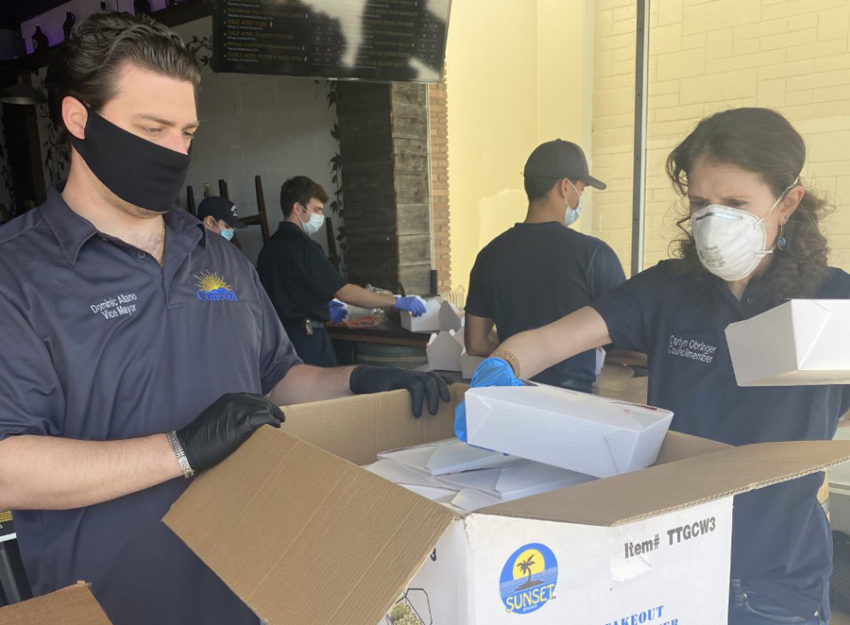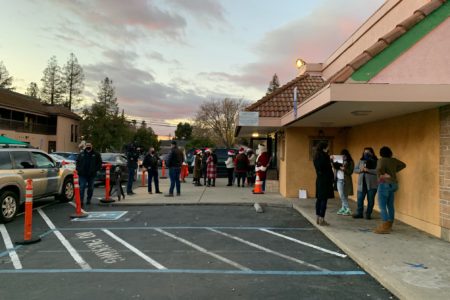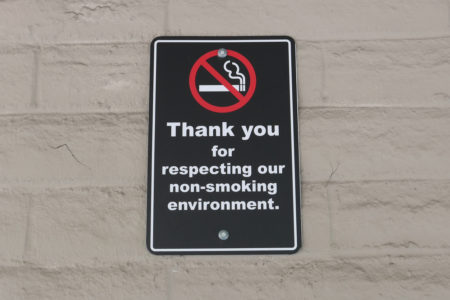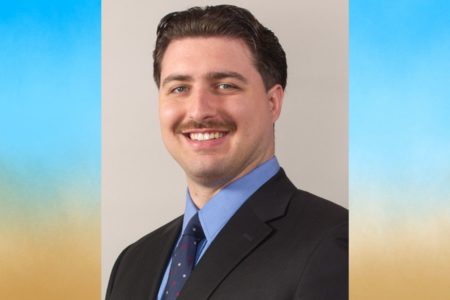
Share On Social!
Growing up in a working-class, union family, Dominic Aliano saw firsthand how local governance could help people in his hometown.
Aliano now serves as the Vice Mayor of that city, Concord, Calif (29.9% Latino).
He has led numerous initiatives to improve life in Concord ─ including the city’s smoke-free multifamily housing ordinance, which prohibits smoking inside units of all apartments.
Smoke-free multifamily housing helps protect families who face toxic secondhand smoke exposure and other systemic inequities where they live, according to Aliano.
“This legislation and ones like it are really important for people, especially those in the communities that I represent, who are mostly renters in multi-family housing complexes,” he said. “Sometimes landlords take advantage of those families. It’s about making sure that you put policies in place that make sure they are in a healthy environment [regardless] of who they are or how much money they make.”
The Need for a Smoke-Free Ordinance for Multifamily Housing in Concord
In Concord, like many other cities, the air could be healthier.
For example, the Respiratory Hazard Index Score for Contra Costa County, where Concord is located, is 1.91.
Scores over 1.0 indicate a potential for adverse health effects.
And, sadly, adverse health effects are happening. In Contra Costa County, the annual cancer incidence rate is 423.3 cases per 100,000 people (higher than the rate of 404.6 in the rest of California). Also, adults here are more likely to have asthma (16.4%) than the rest of the state.
As Aliano learned, people who rent apartments, condominiums, and duplexes in Concord also have to deal with another air quality issue in their homes ─ secondhand smoke.
Secondhand smoke is linked to cancer and heart disease. 
There is even data to suggest that some forms of exposure are more harmful than other, such as sidestream exposure — a mix of mainstream smoke, the smoke exhaled out by a smoker, and sidestream smoke from the burning tobacco product.
It’s one of the reasons why Aliano and his colleagues, as well as grassroots advocates—seven Latino women living in multifamily housing in Concord—considered an ordinance for smoke-free multifamily housing units.
In Contra Costa County, 34.1% of housing is renter-occupied. Nationally, one quarter of U.S. residents—approximately 79 million people—live in multifamily properties.
Most are nonsmokers. But about half are exposed to secondhand smoke.
Inside multifamily dwellings, secondhand smoke can travel through doorways, halls, windows, ventilation systems, electrical outlets, and gaps around fixtures and pipes.
“Based on several studies, an estimated 44 percent to 53 percent of multi-unit housing residents that do not allow smoking in their home, have experienced secondhand smoke infiltration in their home from elsewhere in or around the building,” according to the American Lung Association.
How Did Concord Develop a Smoke-Free Multifamily Housing Policy?
The initiative for smoke-free multifamily housing began with the help of a group of dedicated Latina advocates who brought their concerns before local leaders, such as Aliano.
“What I love is that it all started from Latino women within my district organized this themselves,” he said. “They set up meetings, with individual councilmembers and talked about the issues of trying to raise a healthy family within an apartment complex.”
The Latinas came to the City Council to discuss the dangers of secondhand smoke in multifamily housing, despite the fact that many of them spoke little English or needed translators.
Aliano called their efforts to meet on this challenge without fear brave and inspiring, especially as he comes from a home of immigrants who have struggled with similar language barriers.
From there, Aliano said it was “a no-brainer” for him and his colleagues in city council to push for this legislation.
Members of city members’ staffs wrote the ordinance, and it was received with unanimous support from local legislators as well as the residents of Concord, according to Aliano.
The proposed regulation easily passed in January 2020. The city joins a list of over 60 other California cities with similar policies. 
The ordinance put forth smoke-free rules in a number of areas, including:
- Existing units: Every lease or other rental agreement for the occupancy of any existing unit entered into, renewed, or continued month to month on or after January 1, 2021
- New units: Every lease or other rental agreement for the occupancy of any new unit entered into, renewed, or continued month to month on or after the effective date
- A clause providing that it is a material breach of the agreement to knowingly or intentionally allow, or engage in, smoking in the unit, including exclusive-use areas such as balconies, porches, or patios
- A tenant who breaches, or knowingly and intentionally allows any other person subject to the control of the tenant to breach, a smoking provision of a lease or other rental agreement for the occupancy of a unit shall be liable for the breach to the landlord; and any occupant of the unit who is exposed to smoke or who suffers damages as a result of the breach
- A landlord shall not be liable to any person for a tenant’s breach of smoking regulations if the landlord has fully complied with this section
One year later, in January 2021, the ordinance went into full effect.
Now, all Concord tenants who live in multifamily housing are no longer able to smoke in their units or in spaces near other units — even if it is outdoors.
“After the advocates organizing, city council coming together to make it a priority to get this done, getting our staffs to work on the ordinance — it was which was amazing,” Aliano said. “I mean, it was just the right thing to do. Everyone in the community and everyone on the council was really supportive of this.”
Health experts agree that smoke-free policies are the only way to truly protect those living in multifamily housing from exposure to secondhand smoke.
“Secondhand smoke flows between units through air filtration systems and other means. It cannot be contained. Multifamily buildings share air ducts or vents, which means a lit cigarette in one unit can easily transmit tobacco smoke into another unit,” The Department of Housing and Urban Development states. “Even in modern buildings designed to minimize air transfer among units, there is no way to guarantee that smoke will not be blown from unit to unit through open windows. A recent public housing study identified movement of smoke among units and evidence of improved air quality in buildings with smoke-free policies.”
The American Society of Heating, Refrigerating, and Air Conditioning Engineers (ASHRAE) shares this sentiment.
“At present, the only means of effectively eliminating health risk associated with indoor exposure is to ban smoking activity,” according to their 2010 position statement that they reaffirmed in 2019.
Without such a policy, multifamily tenants are exposed to numerous harms.
“Most know that smoking harms the smoker, but few realize there is solid research linking secondhand smoke to asthma, SIDS, COPD, recurrent ear and pulmonary infections, many cancers, and the possibility to spread COVID-19,” Dr. Claudia Miller, leader of the Hoffman TILT (Toxicant-induced Loss of Tolerance) research program at UT Health San Antonio, said. “The personal, social, and financial costs of COVID-19 and these secondhand-smoking conditions are incalculable.”
Aliano’s History of Helping Others Through Civic Engagement in Concord
For Aliano, helping his Concord neighbors and community members that he grew up with was a life-long dream.
“I was born, raised, and educated in Concord, so Concord is my home town,” Aliano said.
“Growing up in a working-class, union family and being involved in government and politics — I’ve always had this interest in a public service and helping others. Having the love and passion that I have for my hometown to me, it just felt natural to run for this position because I wanted to give back and help families like mine. The working class families. Do anything I can to help their lives become a little bit better.”
This education in civic engagement and its impacts on daily life led to his eventual participation in Concord’s city government.
“It was just a natural transition for me. I think it comes from growing up in a blue-collar family. Sitting at the dinner table and listening to my father, my mother speak [about issues]. From being around his friends that were part of the union who talked about worker’s rights. It became normal for me,” Aliano said. 
During his time in office, in addition to the smoke-free multifamily housing ordinance, Aliano has worked on other initiatives to help disadvantaged communities in Concord — especially when it comes to worker’s rights.
“A master developer that interest in developing the Concord Naval weapons station, which is a big development, but didn’t want to do what was right for the working-class community in Concord and the greater Contra Costa County area,” he said. “After negotiations, discussions, and getting nowhere with that developer to work with the local unions, working-class families within the community, myself and two other council members decided not to push forward with that developer.”
This kind of work, along with the numerous pieces of legislation Aliano has helped pass, all come from a desire to help others — something he says should drive actions like these.
What You Can Do
For those wanting to see a similar smoke-free multifamily housing ordinance in their town, Aliano says the best approach is taking the time to create a well-rounded approach.
“I would say, the best thing to do is to find individual families that agree with you, then organize,” Aliano said. “Get a better understanding of how your city government is run. If you look at the way the City of Concord operates, it’s not the mayor who decides things, it’s not the vice mayor decides things. It’s not the city manager. It’s the city council, because we’re a general law city. Once you learn how your government works, speak with your representative and try to organize with community non-profits or other organizations to help push it across the finish line.
“It all starts with a conversation.”
The best way for someone to protect themselves and others is by quitting smoking.
You can get help from the free Quitxt Program from Ramirez’ team at UT Health San Antonio.
The Quitxt program, developed with the support of the Cancer Prevention and Research Institute of Texas, is a bilingual service for smartphones that sends messages via text or Facebook Messenger to help coach and encourage people on the journey toward smoking cessation.
Also, download the Salud America! Action Pack “Help Your City Adopt Smoke-Free Multifamily Housing!”
The action pack will help you engage local leaders in exploring a smoke-free multifamily housing policy for common areas and individual units.
“Experts say a smoke-free multifamily housing policy can protect the health of tenants and staff of apartments from secondhand smoke, as well as save property owners money in unit maintenance, fire prevention, insurance, and reduced legal liability,” said Dr. Amelie G. Ramirez, action pack creator and director of the Salud America! Latino health equity program at UT Health San Antonio.
By The Numbers
24
percent
of Mexican American-nonsmokers are exposed to secondhand smoke
This success story was produced by Salud America! with support from the Robert Wood Johnson Foundation.
The stories are intended for educational and informative purposes. References to specific policymakers, individuals, schools, policies, or companies have been included solely to advance these purposes and do not constitute an endorsement, sponsorship, or recommendation. Stories are based on and told by real community members and are the opinions and views of the individuals whose stories are told. Organization and activities described were not supported by Salud America! or the Robert Wood Johnson Foundation and do not necessarily represent the views of Salud America! or the Robert Wood Johnson Foundation.



